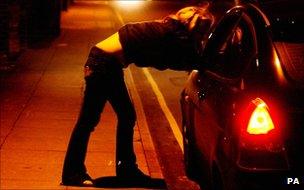How to get more with less in the police
- Published
- comments

A smile may have crossed the lips of ministers and officials at the Home Office today when they read the conclusion of an important piece of academic research into "targeted policing".
Those (like the Home Secretary) who claim that chief constables should be able to do "more with less" base their optimism in part on the theory that if officers focus on crime hot-spots rather than general patrolling they can cut budgets and criminality at the same time.
So-called problem-oriented, intelligent or targeted police activity is the mantra of those who believe overall police numbers can be reduced without an increase in crime.
Critics suggest that such tactics are likely simply to move the problem round the corner, displacing crime to another neighbourhood as the villains work out where the constables have gone.
The answer to cutting crime, they would argue, is to have as many police officers on the streets as possible, patrolling every district to alarm potential offenders and reassure the law-abiding.
So who is right?
'Feral underclass'
Well, a systematic review of 44 international studies has just been published, external and the answer is that there is "no evidence that focusing on crime 'hot-spots'…resulted in the displacement of crime".
Quite the contrary: the research suggests that neighbouring districts often actually see improvements too. "The study identifies knock-on crime reduction benefits for nearby areas in some cases."

An operation targeting prostitutes in London did not displace the problem - it solved it
The team from UCL's Department of Security and Crime Science call the phenomenon the "diffusion of benefits".
Author Dr Kate Bowers says, external: "The police service is being asked to do more with less. Evidence that targeted policing works and can have widespread benefits is good news for both police and the public purse."
One of the studies the team looked at was carried out in Rochdale in the late eighties. Police were alarmed by levels of domestic burglary, particularly on the homes of single mums living on the deprived Kirkholt estate.
So, they focused their efforts on protecting those particular houses but achieved big reductions in burglaries in parts of the estate where they were not active - a "diffusion of benefits".
Today's research also suggests something quite interesting about the way criminals behave.
This week Justice Secretary Kenneth Clarke wrote of Britain's "feral underclass", external, a criminal group apparently immune to the impact of the justice system.
Dr Bowers, however, believes her research "adds weight to the view that criminal behaviour may be more 'normal,' in the sense that it is driven by satisfaction of fundamental needs and wants which are guided by cognitive reasoning, rather than by sociological or psychologically entrenched, deviant 'propensities'."
Again, this is encouraging news because it suggests that focused and intelligent interventions can change the behaviour of potential offenders who will weigh up the pros and cons of breaking the law.
Benefits' effect
Today's report claims that if police are able to block crime opportunities it may make satisfying individual needs through legitimate activities more appealing.
The researchers quote an operation targeting prostitutes operating in the Finsbury Park area of North London.
The approach did not simply displace the problem - it solved it.
Apparently, many of the prostitutes "gave up prostituting following street closures and a policing crackdown", the conclusion being that they "appeared to offset the ratio between the effort, risk and reward of engaging in sex acts in exchange for money".
The new research explains that these and other findings "are in line with theories that suggest offenders are not necessarily so determined to offend that they will simply 'move round the corner'."
The authors say that potential criminals not only prefer familiar environments, but "might be unclear as to the scope of targeted police activity and believe police to be operating in a wider area - hence the 'diffusion of benefits' effect."
In short, it's not how many police you have that matters, but what you do with them.